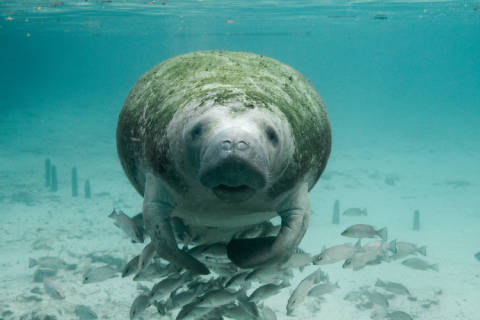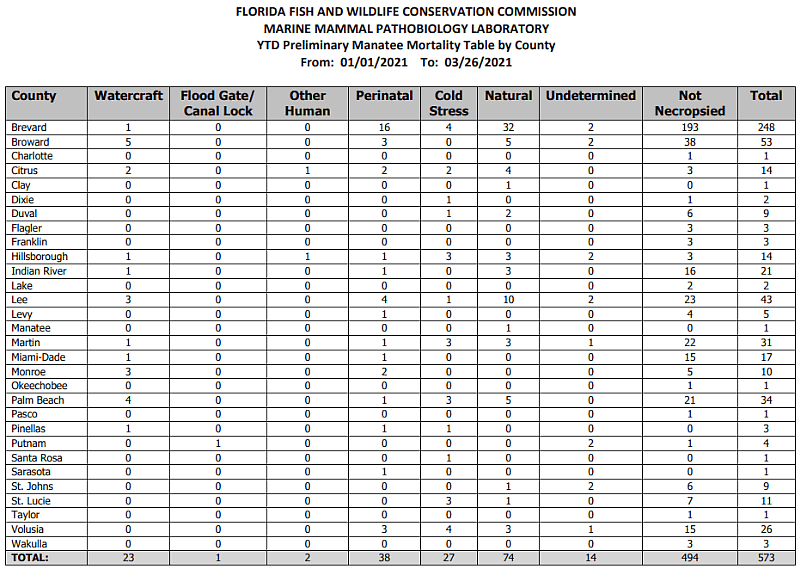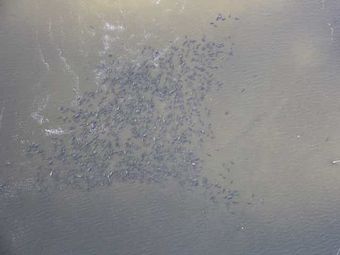IRLNews:2021-04-01/Indian River Lagoon Manatee Mortality Update: Difference between revisions
mNo edit summary |
mNo edit summary |
||
| Line 64: | Line 64: | ||
The Port Saint John compartment has no inflows other than nutrient laden stormwater run-off. The exchange of water with other IRL compartments is impeded on the north by SR405 NASA Causeway (82% constriction), and SR528 Merritt Island Causeway (73% constriction) to the south. Hard embankments on the west shore and mosquito impoundments on the east eliminate 100% of the lagoon's natural filtering systems. | The Port Saint John compartment has no inflows other than nutrient laden stormwater run-off. The exchange of water with other IRL compartments is impeded on the north by SR405 NASA Causeway (82% constriction), and SR528 Merritt Island Causeway (73% constriction) to the south. Hard embankments on the west shore and mosquito impoundments on the east eliminate 100% of the lagoon's natural filtering systems. | ||
The lack of water exchange causes an estimated 220 day residence time in this compartment. What goes into the lagoon may remain for 7 - 8 months. | The lack of water exchange causes an estimated 220 day residence time in this compartment. What goes into the lagoon may remain for 7 - 8 months. However, the PSJ compartment is well blended, because the plant's cooling system circulates as much as 700m gallons of it's impounded water daily.<ref>[https://www.orlandosentinel.com/news/environment/os-fpl-power-plant-manatees-20101205-story.html FPL customers pay to keep manatees cozy and alive - Orlando Sentinel], published 2010-12-05, retrieved 2021-04-01.</ref> | ||
Assuming that Brevard's visiting manatee herd excretes half of the seagrass it eats, amounts to 35,000lbs per day, or 3.15m lbs per winter, added to the PSJ compartment's nutrient load. | |||
The good news is that the Indian River's water temperature is warming up, and the manatees are dispersing to more fertile areas. | The good news is that the Indian River's water temperature is warming up, and the manatees are dispersing to more fertile areas. | ||
Revision as of 11:42, April 28, 2021
As of March 26, 2021, a record 573 deceased manatees have been reported to the Florida Fish and Wildlife Conservation Commission (FWC) this year.[3]
The Indian River Lagoon National Estuary watershed has reported 371 manatee deaths to the FWC so far this year.[4]
| County | 2/26/2021 | 3/26/2021 |
|---|---|---|
| Volusia | 16 | 26 |
| Brevard | 168 | 248 |
| Indian River | 13 | 21 |
| St. Lucie | 4 | 11 |
| Martin | 24 | 31 |
| Palm Beach | 29 | 34 |
| Total | 254 | 371 |
Brevard County Manatee Mortality
In the first 85 days of 2021 Brevard County citizens reported 248 manatee deaths to the FWC. These manatee mortalities have met the criteria to be declared an Unusual Mortality Event (UME) by the Working Group on Marine Mammal Unusual Mortality Events, and the U.S. Fish and Wildlife Service has confirmed the UME determination.
There are many factors affecting Brevard's manatee population. All due to human impact.
Natural Migration Interruption
During the winter manatees congregate in the Port St. Johns compartment of the North Indian River Lagoon due to the warm water discharge from the power plant. Manatees would normally migrate south as the water temperature drops, but the power plant's warm water outflow distracts them from their natural migration. While the resident manatee population is estimated at 500 individuals, a 2016 aerial survey counted 1,400 winter manatees in the PSJ compartment of the North IRL.
Loss of Seagrass
It is estimated that the Indian River Lagoon has lost 54% of the record high seagrass coverage recorded in 2007.[5]
Manatees may eat up to 10% of their body weight daily. Even with perfect water quality the PSJ compartment of the North IRL could not possibly produce enough seagrass to support the huge visiting manatee population attracted to the power plant's warm discharge. For example, lets assume that 1400 manatees with a average weight of 500lbs might consume seagrass at the rate of 70,000lbs daily or 6.3m lbs during a 90 day winter.
Water Quality in the PSJ Compartment
The Port Saint John compartment has no inflows other than nutrient laden stormwater run-off. The exchange of water with other IRL compartments is impeded on the north by SR405 NASA Causeway (82% constriction), and SR528 Merritt Island Causeway (73% constriction) to the south. Hard embankments on the west shore and mosquito impoundments on the east eliminate 100% of the lagoon's natural filtering systems.
The lack of water exchange causes an estimated 220 day residence time in this compartment. What goes into the lagoon may remain for 7 - 8 months. However, the PSJ compartment is well blended, because the plant's cooling system circulates as much as 700m gallons of it's impounded water daily.[6]
Assuming that Brevard's visiting manatee herd excretes half of the seagrass it eats, amounts to 35,000lbs per day, or 3.15m lbs per winter, added to the PSJ compartment's nutrient load.
The good news is that the Indian River's water temperature is warming up, and the manatees are dispersing to more fertile areas.
Contact FWC Wildlife Hotline at (888) 404-3922 to report a deceased manatee.
Video
Video courtesy of Brevard Indian River Lagoon Coalition
Web Links
- Bloomberg Businessweek: Nobody Knows How to Wean Manatees Off of Power Plants
- FPL customers pay to keep manatees cozy and alive - Orlando Sentinel
- FWC - Summary of Warm Water Refugia Issues
- FWC: Manatee Mortality Event Along The East Coast: 2020-2021
- NOAA Marine Mammal Unusual Mortality Events
- Winter Manatee Foraging Behavior and the Decline of Seagrass Beds in the Northern Indian River Lagoon USGS 2015
- FWC Update to the Statewide Florida Manatee Abundance Estimate
Documents
- FWC 2021 Preliminary Manatee Mortality Table (PDF 19pp 562KB)
- FWC 2021 YTD Manatee Mortality Table (PDF 1p 113KB)
- Updated Statewide Abundance Estimates for the Florida Manatee (PDF 27pp)
References
- ↑ Updated Statewide Abundance Estimates for the Florida Manatee (PDF 27pp), ISSN 1930-1448, page 5, retrieved 2021-04-01.
- ↑ Federal Register Vol. 81, No. 5 (PDF 28pp), page 2, retrieved 2021-04-01.
- ↑ FWC 2021 Preliminary Manatee Mortality Table (PDF 14pp 562KB), retrieved on 2021-04-01.
- ↑ FWC 2021 YTD Manatee Mortality Table (PDF 1p 113KB), retrieved 2021-03-07
- ↑ Dr. Chuck Jacoby, SJRWMD, 2020 Water Quality Presentation Video, retrieved: October 11, 2020
- ↑ FPL customers pay to keep manatees cozy and alive - Orlando Sentinel, published 2010-12-05, retrieved 2021-04-01.





